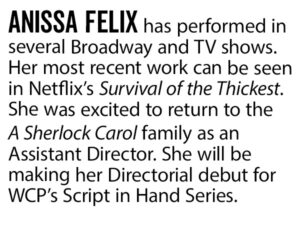Enjoy this interview with between Script in Hand curator Mark Shanahan and Anissa Felix. Anissa is the director of Paris, our April Script in Hand playreading.
MARK SHANAHAN: What draws you to Eboni Booth’s Paris? What do you find compelling about this play and the story it tells?
ANISSA FELIX: One of the reasons Paris resonates with me, is that it explores what it means to be invisible. It touches on who gets to be powerful and who must serve. But in the midst of all this desperation, is the deep need to feel seen.
MARK: You’ve been a part of the Playhouse in so many ways—actor, assistant director, and now director. What keeps bringing you back, and what does this theater mean to you as an artist?
ANISSA: I’m afforded a great deal of artistic freedom at Westport Country Playhouse. Working as an Assistant Director on past shows (A Sherlock Carol and Theatre People), I’ve learned so much under your mentorship, Mark. Now I’m excited to take what I’ve been learning and apply it to directing my first Script-in-Hand.
Westport Country Playhouse is an icon in itself. Backstage, there’s a small, square cut-out exposing the original stage floor, upon which every artist since 1931 has stepped. And when I plant my own feet there, I’m reminded of the deep and storied history of this theatre. How lucky am I?
MARK: This play explores workplace dynamics, class, and the struggles of just getting by. What themes or ideas in Paris feel especially relevant to you right now?
ANISSA: In 2025, where around 30% of Americans are estimated to be living paycheck to paycheck, this play feels more timely then ever. The characters of Paris, are people you encounter everyday; they’re your friends and neighbors. Wendy is the woman ringing up your purchases at the check-out line. Logan is the kid preparing your take-out order and delivering it to your door. And we rarely think of their stories and their struggles, let alone mount them onstage.
Paris also poses the question of power dynamics within the workplace. How does one behave when they are instilled with power at their job but are disenfranchised in their everyday life. And why is it ok for certain people to break the rules, but not for others?
MARK: This play is set in a big-box store, an environment many people have experienced firsthand. How does that setting influence the tone and storytelling?
ANISSA: While now you’re seeing a gorgeous New England hotel room (from our currently running play Theatre People), Paris is set in the far less glamorous break room of Berry’s, a big box store. Think Walmart, but more sparse and with harsher lighting.
In this utilitarian environment, bathroom breaks are timed and any minute gone over gets docked from your pay. There are a limited number of lockers for employee’s personal belongings; so if you’re smart with it, you can hide your things within the dusty drop ceiling tiles. Sneaky indoor smoke-breaks have stained the walls with nicotine. And a coffeemaker carafe is ringed with calcification. But it’s the holiday season, so a few strings of multi-colored Christmas lights work overtime to make the place look festive.
MARK: How do you approach working with actors as a director? Are there specific ways your acting experience helps you communicate with them?
ANISSA: Building a show is a bit like putting a jigsaw puzzle together. As an actor, I’m one piece of the puzzle. But as a director, I’ve got the reference photo to work with.
When I act, I like to be guided by my director but also be allowed the freedom to experiment with different acting intentions. And when I direct, I like to allow the actor to discover new moments that I may not have originally envisioned. I think being on both sides has made me really enjoy the collaboration even more.
MARK: What kinds of plays—classic or contemporary—are on your wish list to direct?
ANISSA: Stick Fly by Lydia R. Diamond always has a place in my heart.
CLICK HERE or on the graphics above to read Anissa’s bio.

